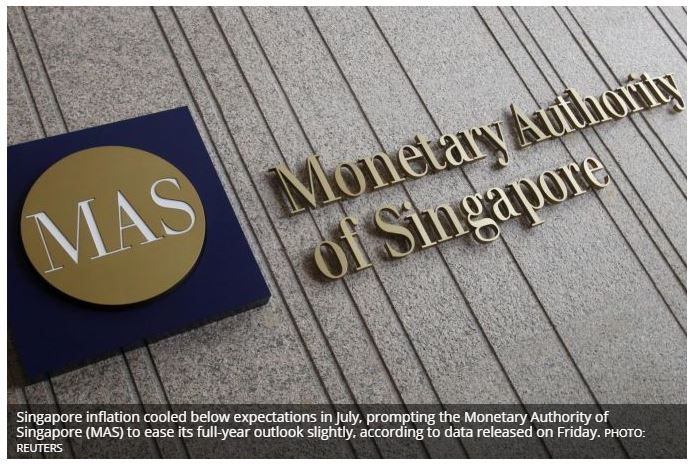Singapore’s July price increase the slowest in 3 years; MAS tweaks core inflation outlook
SINGAPORE inflation cooled below expectations in July, prompting the Monetary Authority of Singapore (MAS) to ease its full-year outlook slightly, according to data released on Friday.
Core inflation – a key MAS indicator that strips out private road transport and accommodation expenses – cooled to 0.8 per cent, its weakest showing since April 2016, against 1.2 per cent in June. The figure was also lower than the estimate of 1 per cent by private-sector economists.
MAS chief economist Edward Robinson had soundly rejected off-cycle adjustments to the Singdollar policy on Aug 13, reiterating a full-year core inflation forecast of 1 per cent to 2 per cent.
But the MAS’s view has now shifted from “near the midpoint” to the lower half of the range. This is the second change to the official inflation outlook after February, when the headline inflation forecast was lowered by half a percentage point, to between 0.5 per cent and 1.5 per cent.
This was even as accommodation costs fell by 0.9 per cent, slower than 1.1 per cent in the month prior, on the slower decline in rent, while the cost of private road transport rose by 0.3 per cent – up from 0.2 per cent in June – as repair and maintenance costs picked up.
Meanwhile, headline all-items inflation slipped to 0.4 per cent, down from the 0.6 per cent price increase registered in June and below the estimate of 0.5 per cent in a Bloomberg poll.
The more gradual increase in everyday expenses came on a fall in the prices of retail goods and water, as well as a larger decline in the cost of electricity and gas.
Services inflation – which came in at 1.6 per cent, down from 1.7 per cent in June, on slower growth in holiday costs and a bigger drop in telecommunications fees – also cooled the scene.
The MAS and the Ministry of Trade and Industry reiterated in a joint statement that “external sources of inflation are likely to be benign” and “acceleration in inflationary pressures is unlikely” on factors such as slower gross domestic product (GDP) growth and global uncertainty.
“Labour market conditions have largely held up, contributing to moderate wage increases and higher unit labour costs,” they added, tempering June’s statement that “unit labour costs should continue to rise”.
Singapore slashed its GDP forecast for the second time on Aug 13, lowering expectations to between zero growth and 1 per cent for 2019, from 1.5 per cent to 2.5 per cent before.
Source: https://www.businesstimes.com.sg/government-economy/singapores-july-price-increase-the-slowest-in-3-years-mas-tweaks-core-inflation


 English
English




